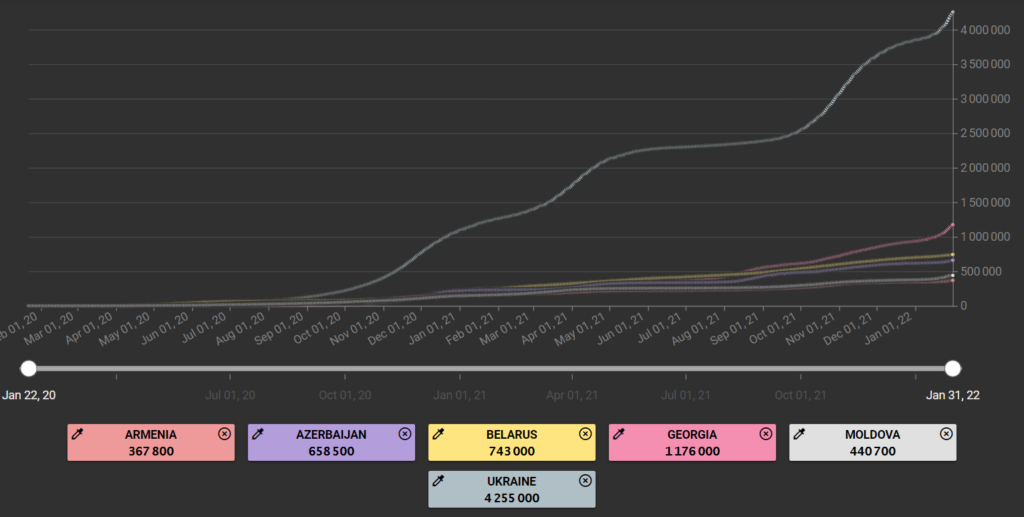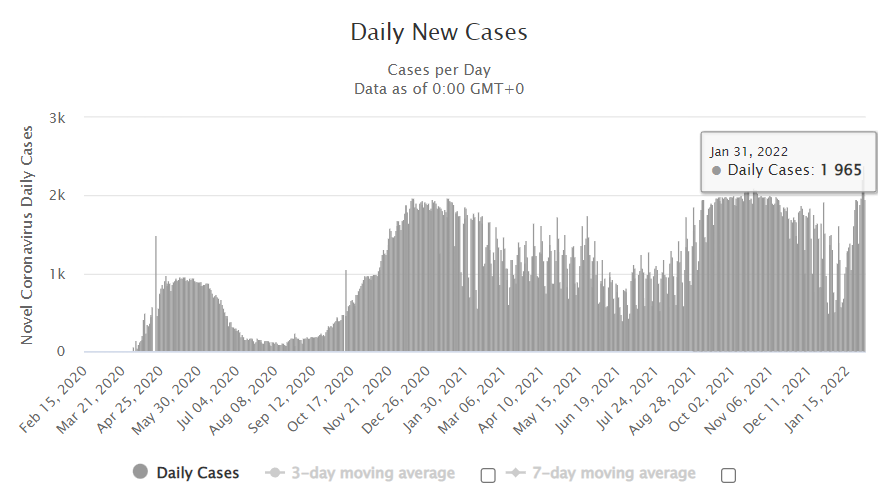Within EU-funded COVID-19 Solidarity Programme for the Eastern Partnership countries AFEW International prepares regular updates on the COVID-19 developments in the region – Armenia, Azerbaijan, Belarus, Georgia, Moldova, and Ukraine. What is the situation today? Please, check it here!
You can find previous updates in the COVID Corner on our website.
As for 01.02.2022
The number of coronavirus cases per population ratio since the start of the pandemic (January 22, 2020) in the 6 countries of the EaP
Source: Sciences Po Media lab Coronavirus Country Comparator

February 3, 2022 COVID-19, EU COVID-19 Solidarity, News
BI-WEEKLY COVID-19 SITUATION REPORT FOR 6 COUNTRIES OF THE EASTERN PARTNERSHIP. 01 FEBRUARY 2022.
Within EU-funded COVID-19 Solidarity Programme for the Eastern Partnership countries AFEW International prepares regular updates on the COVID-19 developments in the region – Armenia, Azerbaijan, Belarus, Georgia, Moldova, and Ukraine. What is the situation today? Please, check it here!
You can find previous updates in the COVID Corner on our website.
As for 01.02.2022
The number of coronavirus cases per population ratio since the start of the pandemic (January 22, 2020) in the 6 countries of the EaP
Source: Sciences Po Media lab Coronavirus Country Comparator
SITUATION REPORT ARMENIA

Cases of COVID-19
— COVID-19 infections in Armenia are at their peak — the highest daily average reported — now at 2,199 new infections reported each day.
— There have been 367,795 infections and 8,053 coronavirus-related deaths reported in the country since the pandemic began.
Measures to contain the epidemic
— Armenia extends existing COVID-19 measures until June 20, 2022.
— Domestic measures: all staff must demonstrate proof of COVID-19 vaccination to their employers or self-fund a PCR test every 14 days; some categories of person, including pregnant women, are exempt. Protective face coverings are mandatory in public spaces, including on public transport, and restrictions on gatherings remain in place. Businesses are permitted to reopen provided they maintain strict hygiene and social distancing requirements.
— International travel restrictions: international flights are permitted and land borders are open; however, international arrivals via air or land must produce proof of having tested negative for COVID-19 using a PCR test taken no more than 72 hours before arrival or evidence of full COVID-19 vaccination. Individuals arriving without the required documentation must pay for a test on arrival and self-isolate until a negative result is confirmed.
Vaccine
— Armenia has administered at least 1,825,382 doses of COVID vaccines so far. Assuming every person needs 2 doses, that’s enough to have vaccinated about 30.9% of the country’s population.
SITUATION REPORT AZERBAIJAN

Cases of COVID-19
— COVID-19 infections are increasing in Azerbaijan, with 3,426 new infections reported on average each day. That’s 82% of the peak — the highest daily average reported on December 14.
— There have been 658,470 infections and 8,734 coronavirus-related deaths reported in the country since the pandemic began.
Measures to contain the epidemic
— Restrictions on travelling to and out of Azerbaijan by air or land are in force until the 1st of March 2022, except for cargo and charter flights.
Vaccine
– Azerbaijan has administered at least 12,000,767 doses of COVID vaccines so far. Assuming every person needs 2 doses, that’s enough to have vaccinated about 59.9% of the country’s population.
SITUATION REPORT BELARUS

Cases of COVID-19
— COVID-19 infections are increasing in Belarus, with 2,021 new infections reported on average each day. That’s 98% of the peak — the highest daily average reported on October 26.
— There have been 742,953 infections and 6,052 coronavirus-related deaths reported in the country since the pandemic began. Measures to contain the epidemic
— COVID-19-related restrictions in Belarus remain generally unchanged as of 4 January 2022 by comparison with those in effect during late November. The only substantive change in the government’s directives is that citizens arriving from abroad are no longer required to self-isolate.
Vaccine
– Belarus has administered at least 9,714,033 doses of COVID vaccines so far. Assuming every person needs 2 doses, that’s enough to have vaccinated about 51.3% of the country’s population.
SITUATION REPORT GEORGIA

Cases of COVID-19
— COVID-19 infections in Georgia are at their peak — the highest daily average reported — now at 16,647 new infections reported each day.
— There have been 1,175,923 infections and 14,980 coronavirus-related deaths reported in the country since the pandemic began.
Measures to contain the epidemic
— All vaccinated arrivals must present evidence of a completed vaccination cycle, or of recovery from Covid within 100 days alongside an initial vaccination.
Those arriving via land or sea must also present a negative PCR test taken within 72 hours of arrival, in Georgian, English or Russian. Children under 10 are exempt from the testing requirement.
For non-vaccinated arrivals from the countries listed above, the restrictions are tighter. They must travel direct to Georgia, with no stop-offs or transits. On arrival at the border they must present a negative PCR test taken within 72 hours of arrival, and must take a further PCR test on day three. They must also fill in a contact tracing form.
SITUATION REPORT REPUBLIC OF MOLDOVA

Cases of COVID-19
— COVID-19 infections in Moldova are at their peak — the highest daily average reported — now at 4,463 new infections reported each day.
— There have been 438,249 infections and 10,635 coronavirus-related deaths reported in the country since the pandemic began.
Measures to contain the epidemic
— Markets, restaurants and bars are operating usual hours, including food delivery services. Malls and commercial centres are operating usual working hours (until 10pm). Schooling is both online and in-person. Nightclubs are closed. Restaurants, cafes, theatres, cinemas and concert halls are open, but access will only be permitted upon presentation, either on paper or electronically, of one of the following documents (for persons over the age of 18):
- a COVID-19 vaccination certificate evidencing full vaccination;
- a negative PCR test result taken no more than 72 hours before the event;
- a negative rapid antigen test result taken no more than 48 hours before the event;
- confirmation of the presence of COVlD-19 antibodies (serological antibodies test).The document is valid for a period of 90 days from the date of the test.
You must also carry one form of photo identification as well as your COVID-19 document such as a passport or driving license.
You must wear a mask outside at mass gatherings, and in enclosed spaces such as supermarkets, restaurants, bars and on public transport. Officials have the authority to issue fines for non-compliance. Social distancing of 1m must be observed.
Vaccine
— Moldova has administered at least 1,931,716 doses of COVID vaccines so far. Assuming every person needs 2 doses, that’s enough to have vaccinated about 36.3% of the country’s population.
SITUATION REPORT UKRAINE

COVID-19 cases
— COVID-19 infections in Ukraine are at their peak — the highest daily average reported — now at 27,732 new infections reported each day.
— There have been 4,064,495 infections and 100,203 coronavirus-related deaths reported in the country since the pandemic began.
Measures to contain the epidemic
— Coronavirus measures are in place until 31 March 2022, but may be extended further. Ukraine is operating a colour-coded adaptive quarantine system on a regional (oblasts and Kyiv city) basis. Quarantine measures may be imposed, and change, at short notice. You should check which restrictions apply to the places you intend to visit, and be ready to prove your vaccination status.
In all zones, the following rules apply:
- you must carry ID with you at all times
- when in public buildings (including restaurants, hotels and shops) you must maintain a minimum distance of 1.5 m.
- when in public buildings, and while travelling on public transport and in taxis, you must wear a protective mask covering your nose and mouth
- Failure to comply with restrictions may result in a fine or, in more serious cases, a prison sentence. Before taking public transport, you should consider whether you will be able to maintain social distancing.
In regions classified as “green” zones, there are minimal restrictions beyond mask-wearing and distancing.
In “yellow” and “orange” zones, mass events are prohibited unless all staff and participants have one of the following: a certificate of full vaccination (within the last 365 days), a certificate of recovery from Covid-19 (within the last 105 days) or a certificate of a negative PCR or rapid-antigen test (within the last 72 hours). The same restrictions apply to the opening of indoor hospitality venues, entertainment and cultural institutions, fitness centres and swimming pools, hostels and guesthouses.
In “red” zones, these measures additionally apply to shopping malls and non-essential retail.
—Supermarkets and other grocery stores, pharmacies, veterinary supplies shops, banks and petrol stations remain open, as well as parks and public spaces.
—Ukraine will accept the UK’s proof of COVID-19 recovery and vaccination record. If you are travelling with a printed PDF proof of vaccination status, it must date from 1 November to ensure that the certificate can be scanned successfully, if domestic certification is required. Your NHS appointment card from vaccination centres is not designed to be used as proof of vaccination and should not be used to demonstrate your vaccine status.
Vaccine
– Ukraine has administered at least 29,992,963 doses of COVID vaccines so far. Assuming every person needs 2 doses, that’s enough to have vaccinated about 33.8% of the country’s population.
Interesting reads



